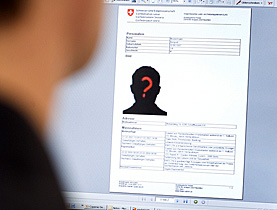Google starts mapping Swiss cities

Fleets of cars fitted with special cameras have begun trawling Swiss cities to collect images for Google's new Street View mapping service.
Street View adds detailed street-level pictures to the search engine’s existing Google Maps application, but the new format has raised concerns among some privacy campaigners.
On Thursday Google’s odd-looking camera cars, with 360-degree cameras mounted on their roofs, began crawling through urban areas in cantons Geneva, Zurich and Bern to record real street images.
Street View, which was also launched in Britain on Thursday, is already available in the United States, Japan, Australia, New Zealand, France, Spain and Italy. It is not clear just yet when a Swiss version will be available.
The new service allows users to savour 360-degree views of cities via their computers and mobile phones.
“Since we introduced Street View in the US, Swiss users have been asking about this service. We’re thrilled to be able to introduce Street View in Switzerland after it recently appeared for several cities in Spain, Italy and France,” Matthias Meyer, spokesman for Google Switzerland, told swissinfo.
But as well as the logistical challenges of taking millions of individual photos of city streets and stitching them together, Street View has also suffered criticism from privacy campaigners since it launched in the US two years ago. They argue that it infringes civil liberties.
The British Daily Mail newspaper has also attacked it as a “burglar’s charter”, allowing criminals to look for potential victims over the internet.
Respect privacy
Although the images include millions of residential addresses, people and cars, Google insists that they will respect individual privacy and Swiss laws.
“We have checked with Swiss law and it’s absolutely allowed to take pictures from public places and streets,” said Meyer.
He said the Federal Data Protection and Information Commissioner had also been consulted over privacy concerns.
Google has also introduced sophisticated technology to automatically blur faces and car number plates to guarantee privacy. And at the bottom of each photograph is a link which people can follow to report a concern to Google.
Those who have been photographed unawares by the car cameras and do not wish to be featured or who want their house or car to be taken off the photo database can register their objections by filling in an online form.
“If it’s inappropriate our people will remove the item immediately,” said Meyer.
“We are not interested in people walking in the streets. The product is about the city and the goal is to allow people to explore cities all over the world.”
Keeping an eye
“We are generally satisfied with Google’s answer, but we are keeping a close eye on the implementation of its privacy measures to check whether it works properly and quickly after an alert,” Eliane Schmid, spokesperson for the Federal Data Protection and Information Commissioner, told swissinfo.
Since its launch in the US, an American couple tried to sue Google over invasion of privacy but subsequently lost the case. Could that also happen in Switzerland?
“A person could, in theory, take a foreign internet firm like Google to court in Switzerland and a Swiss court could well issue a verdict against the company,” said Schmid.
“But how do you enforce that outside Switzerland, for example? That only works if you have international legal cooperation, and as far as the internet is concerned, we’re not really there yet.”
What’s the use?
Street View is creating a big online buzz, but apart from discovering whether we have won a place in online posterity, what will we actually use the service for?
Google says you might use it to view a property to rent or buy, preview your holiday accommodation, show friends abroad where you live, or check out local facilities if you are moving to an area, for example.
Tourist officials have also suggested the application could boost tourism.
Since it was launched software developers have been using its open-source architecture to build various new applications.
In Britain, for example, Google has teamed up with a website which uses Street View to help drinkers find their local pubs.
And in countries where the service has been established for some time, it is gaining cult status with a number of sites springing up dedicated to finding the most weird and wonderful things on Street View, including giant pumpkins, topless women and people drug dealing.
swissinfo, Simon Bradley
Google is a US-based internet search engine that generates revenues from advertising. It was co-founded by former Stanford University students Larry Page and Sergey Brin and first appeared as a private company in September 1998.
The company listed on the stock exchange in 2004 and was worth $23 billion (SFr26 billion) at the time. In 2007 its market capitalisation value was nearing $200 billion.
It has more than 50 offices in 200 countries and employs almost 20,000 full-time staff.
In 2004 Google launched its own free email service called Gmail and bought up a company that had developed a virtual globe programme, that became Google Earth two years later.
Google launched Street View in the US in May 2007. The French Tour de France cycle race for Street View was the first release of Street View in Europe. Since then the service has also become available for Japan, Australia, New Zealand, France, Spain, Italy and Britain.
The ultimate declared aim of Google is to provide street views of the whole world.
To use Street View you can either type an address or postcode into Google Maps and find a static photo of it, or you can drag an orange icon, called “Pegman” across the map and drop it wherever you like. The street has to be highlighted blue.
An image of the area will appear on the screen and you can then use arrows to rotate it.

In compliance with the JTI standards
More: SWI swissinfo.ch certified by the Journalism Trust Initiative











You can find an overview of ongoing debates with our journalists here . Please join us!
If you want to start a conversation about a topic raised in this article or want to report factual errors, email us at english@swissinfo.ch.